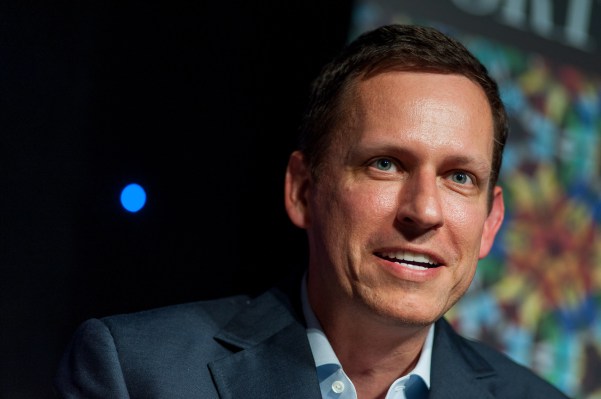Billionaire VC Peter Thiel has largely flown under the radar since raising his hand to support Donald Trump’s presidential bid, then working with Trump’s administration to fill some of its many vacant positions. The association made him deeply unpopular in Silicon Valley, though he says people have not shown a “great deal of hostility to me personally . . . it manifests itself in all sorts of other ways.”
Perhaps ahead of the midterm elections, perhaps because he has more recently moved to L.A., or perhaps because he’s simply feeling more talkative, Thiel is starting to open up again about his often contrarian views to particular outlets. Earlier this year, he sat down with Fox Business to discuss his continuing support of Trump. Thiel talked again last week with commentator and comedian Dave Rubin, whose YouTube show, Rubin says, is focused on free speech. (The interview format is for people with “political PTSD,” suggests its trailer.)
This newest chat, which goes on for more than two hours, touches on a wide number of things, but watching it last night, what we found most striking was Thiel’s continued disdain for academia despite his own background as both a Stanford undergraduate and law school graduate. Thiel has plainly been successful. He also formed the kind of meaningful, lifelong friendships that one hopes to find at college. Indeed, in a separate, rare public appearance this year, Thiel debated Reid Hoffman, a former Stanford classmate and longtime friend of Thiel, at a public policy think tank on Stanford’s campus.
Nevertheless, in his conversation with Rubin, Thiel’s answer to why Silicon Valley has become so “left wing” is higher education. Not instability in the White House or tariffs or immigration or tax cuts or disagreements over foreign policy. Thiel, the free market thinker, thinks schools are to blame for Silicon Valley “groupthink.”
If you want to assume for a minute that he is right, then this is a new problem for the region. Thiel volunteered during the interview that Silicon Valley has “shifted a lot over the years.” Namely, he said, when he was a college student in the late ’80s, Stanford was “sort of a very liberal, politically correct place” but Silicon Valley more broadly “was not. It was vaguely libertarian,” he said. “It was a moderate Republican congressional district.” By the late ’90s, he continued, “it had sort of shifted to [moderately Democrat] and, fast forward 20 years, it shifted pretty hard left.”
Investors and founders and employees in Silicon Valley had undergraduate and advanced degrees 20 years ago, as they do now. But that doesn’t factor into Thiel’s explanation of Silicon Valley’s newer leanings. Said Thiel to Rubin of the evolution, “Part of it is it’s probably the most educated part of the country, in terms of how much time people spend in college. And I think one of the downsides of too much education is that you get the most brainwashed. And so it is the most educated can also mean that it is the most brainwashed.”
He doesn’t think the problem extends so much to founders but to the “rank and file.” Said Thiel, “If you’re a really good engineer or if you’re really good at a specific thing, your education doesn’t involve you thinking that much about politics. So it’s not necessarily from deep ideological conviction; it’s often more as a fashion statement than as a question of power.” (Oof.)
Thiel, who is likable in person, has been talking for nearly a decade about the fact that he thinks higher education is overvalued and may actually be a hindrance to innovation. It’s largely why he created a fellowship program in 2010 that encourages young people with big ideas to drop out of college and take a shot at realizing their dreams. And his point that more highly educated people are leaning “left” is correct. According to data released this spring by the Pew Research Center, “In 1994, 39 percent of those with a four-year college degree (no postgraduate experience) identified with or leaned toward the Democratic Party and 54 percent associated with the Republican Party. In 2017, those figures were exactly reversed.”
Still, it’s disappointing to see Thiel embrace anti-intellectualism, because it’s blatantly divisive (which is maybe his point), because it’s ridiculous coming from Thiel (who isn’t exactly part of the proletariat), and because the argument doesn’t hold up, particularly given that Silicon Valley has long been home to a highly educated workforce, one that used to vote more commonly along Republican lines.
Did college degrees suddenly drive a broader shift in the other direction? No. But moneyed, educated people feigning a reflexive aversion to “elites” may have. Americans in Silicon Valley — and well beyond — are catching onto the act, too.
If you missed the interview last week, you can catch it right here.
